Stuart Cummings Ripley, hereinafter called SCR because his name is far too long for his far too short talent and fits like a
size eighteen dress on an anorexic bolemic. Also, he was a writer of questionable talent who compensated for that by
copiously annoying everyone for whom he worked. That, at least is the cold, sober, studied conclusion of this biographer,
fully aware that others may have concluded otherwise. They must live with their consciences. Personally, this writer has
tried to keep his sanity while laying off the hard-stuff whilst clarifying the record of SCR during the first half of the 1940s.
The reader is cautioned to believe the following events at their own peril.
Until his death (given erroneously as in the late 50s or early 60s, depending on who is espousing, [editor's note: SCR died on February 2, 1964] said demise caused either
by cirrhosis of the liver, or, the equally jaundiced version, again based on the espouser, that he was caught in bed with a
famous attorney's mistress) SCR would not repeat this particular classic yarn without a minimum of three double scotches
consumed within twenty minutes. It is none other than the 'true' story of how SCR saved the lives of a B25 bomber crew,
the plane, and, of all people, Edward R. Murrow. It happened thus-ly and so-ly.
SCR had been jealous of Murrow getting himself aboard bombing missions over Germany. The rules forbade
Murrow doing that; but when Murrow wanted a crew's view of the action, he easily got illegal help from buddies at the
grass-roots level. Or, in this case, the clouds-roots level; a flight crew. The fly-boys tended to avoid SCR as much as they
favored E.R.M.
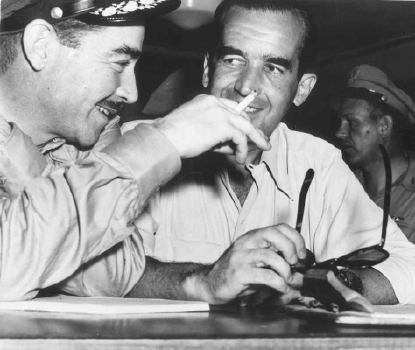 Ripley, left, with Edward R. Murrow, 1944
Ripley, left, with Edward R. Murrow, 1944 That left SCR two possible solutions. One: Stowaway. No good. You could freeze to death at 20,000 feet and even
die of anoxia without proper, warm, flight-clothing and oxygen. That left option two: Impersonate a flight member. But
who? The pilot? No-way. Somebody had to drive that bus. The navigator? No. Somebody had to get the plane to the target
and more importantly, back to base. The gunners? Hell-no! What if enemy fighters attacked? The flight engineer? Nope.
He had to keep the engines happy. The radioman? There's a possibility. Most of the flight was radio-silence anyway, and
for the takeoff and landing all you needed to do is repeat the instructions from the tower to the pilot and say 'roger' a lot.
So...
One fine, early morning just after breakfast and briefing, SCR got the radio man from 'Murrow's flight' aside and
gave him a double sleeping pill in a juice. The guy went right to nap-land. Then, SCR changed into his flight-suit, and,
since it was still dark, he had no trouble slipping on board with the rest of the crew, and nemesis, Murrow.
SCR actually got to cruising altitude by carefully relaying the ground messages and sounding official. He is as
happy as can be, until...
He got bored. Give the guy a break. This mission was going to take nine hours, round trip, if nothing went wrong,
and that's a long time to cramped, uncomfortable, cold, generally miserable and have a chance of being a target yourself
while trying to pound a target. Just as SCR was trying to decide how to amuse himself, BANG!-GrrrRRRoooLlll-Screee-
Screee-Screee!! The screeching along with the precarious location of the racket caused digestive muscles to clamp, twist
and do somersaults. Did a Messerschmitt end everything for everyone on board? Don't think so. They couldn't be over
Germany yet. They weren't - that's the Channel below. Wait a sec... Captain what's-his-name was on the intercom. Oh,
that's what happened. Number four engine threw its prop. Lucky it didn't throw it into engine three or the fuselage or we'd
all be in the drink now. We are on three engines. No problem says the cap. What! No problem? Is he nuts? No. Cap is a
hard-nose. Turn-back does not enter his one-track mind. He has bombs to deliver and he will do that like the proverbial
mailman letting neither rain nor snow nor sleet nor dark of night prevent his appointed duty to safely deliver those bombs,
regardless of engine compliment.
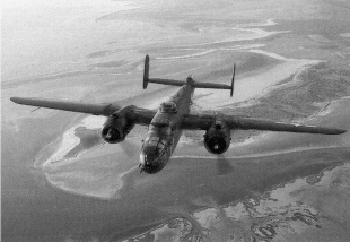 B-25 bomber, designed to bomb from medium altitudes
B-25 bomber, designed to bomb from medium altitudesWith the reduction in power the plane is falling behind the formation and will become a sitting duck to enemy
fighters. But, the cap isn't as dumb as he looks. (Whatever he looked like - How would SCR know?) Miraculously, there
are clouds all the way to the target beginning just ahead at landfall. Cap says we hide in the clouds while completing the
mission and return to base, better late than never. How in hell they were supposed to find the target while swimming
aimlessly in clouds nobody mentioned. Navigation still left a lot to be desired in WW-II. Remember: No GPS satellites
back then. But what the heck - that's the navigator's problem.
SCR figures it's a little dangerous, but, what about any mission isn't dangerous? Anyway, the captain is the boss
and he should know. SCR decided that to pass the time, and lower his fear, he should sing. Except...
He can't sing. Not a baby-bird-peep of a note. However, due to fear almost anything is possible so singing it was.
But not any old songs. No popular ditties of the day - no show tunes - no cowboy melodies - nothing ordinarily acceptable.
SCR will serenade himself, and, unbeknownst-to-him, a whole raft of others, with a mixture of Hindu and Native
American chants that he picked up in a camp for lost boys on an assignment for the WPA during the depression. He
figured those melodies would nicely pass the time even though this investigator doubts anyone would want to even pass gas
to them.
So, SCR started singing his strange cacophony concoction, which, ordinarily, would have been no problem, had he
been taking a shower. Or, no problem with the cold wind whistling around the plane, the rumble of the three remaining
engines and various other vibrational noises. Normally, SCR could have roared his head off and nobody would know. The
problem was that: Unfamiliar with the radio's controls, he had left the Receive/Transmit switch set to Transmit.
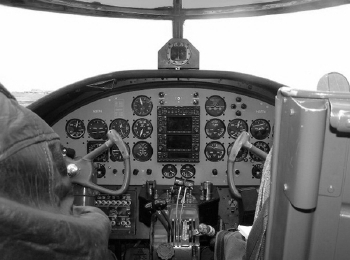 B-25 control panel
B-25 control panelBoth the Allies and the Axis received the weirdest serenade any of them ever heard. The Germans were afraid this
was a new type of homing beacon the Allies developed to accurately whisk them to a target while simultaneously confusing
their interceptors. The Allies were totally confused by this idiotic sound that they concluded could only be a German
navigational jamming transmission.
Amazingly, two rare military intelligence recordings exist of SCR's caterwauling. One, made by British
Intelligence and one from the Luftwaffe Message Intercept Service, Luftinsmegainsceptvice. It was rumored that the US
Navy Code Command, NAVCODCOM, had made a recording but it is equally rumored that some admiral ordered it
destroyed. You can hear the two recordings at, www.unsecretcrap.com/ww2/unintelligence/rantsandraves/scr-audio.
(Those recordings are the basis of the caution: Believe this yarn at reader's peril.)
Well, long story short, the mission returned safely and assorted senior officers were on the tarmac to, in-person,
greet the returning flight. Murrow had enough sense to hang back on board until the fuss blew over, but poor SCR was
caught with his headset still on his head, him not knowing it should be left on-board.
It was easy to get the truth out of SCR as he was shaking in his ill-borrowed, worse-fitting flight boots, now
causing intolerable foot pain. What was Base Commander Gerald Grouchmell von-Grouchbastard to do? (The later von-G
was appended by most of his immediate support officers.) You see...
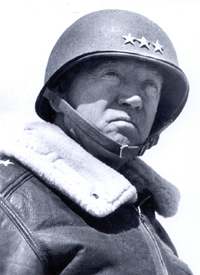 Base Commander Gerald Grouchmell
Base Commander Gerald GrouchmellThere is a complication. SCR is, unofficially, being considered a 'hero' in some upper-level official circles for
confusing the hell out of the enemy and no doubt being responsible for the safe return of all the bombers and crews -
something all but unheard of! Grouchbastard cannot chance a court marshal. He can't even chance tossing SCR in the brig
until the war is over. So, the commander, highly experienced in the ways of the Army, chose to punish SCR by doing;
nothing. Nothing, except to order SCR to never, never file a word of this story of his adventure and promise SCR that if
he ever tries to board another plane he will be shot dead, on the spot, personally, by Grouchbastard himself.
SCR decided to get drunk and forget the unfortunate incident, thus protecting the remnants of his shaky military
reporting career, which was not over since the war was not. What happened next?
Grouchbastard had a few friends at the Pentagon and he called for their help. Without telling von-G how, what or
where, they punished SCR by assigning him to the Manhattan Project. If they couldn't dump him in prison, what
more idyllic location for him than a secret, artificially created post full of scientists in New Mexico? Imagine
SCR, a reporter, surrounded by fences and censoring, gun toting security forces? A writer restricted from
writing due to the A-Bomb who couldn't grab a pay-phone, excitedly demand his editor 'stop the presses', order
up a copy-boy and report a scoop like, Oppenheimer reconfigures A-bomb case based on enriched U-238
cutting weight in half making bomb deliverable by new B-29. Yes, that is why the army closely monitored the
mail, the phones and everything else.
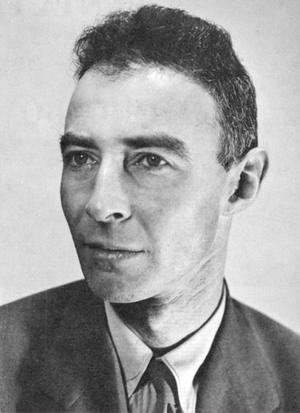 J. Robert Oppenheimer, "father" of the atomic bomb
J. Robert Oppenheimer, "father" of the atomic bombWhat was SCR to do in a dessert besides serenade cactus? Lucky him. General Groves, head honcho of
the M-Project, wanted a historian. Groves was smart. He knew that even though, during the war, everything had
to zipped tighter than a trapeze artist's butt, in a few decades the world could know what happened and he
wanted to be sure his side of the story would be told.
For the duration of the war SCR wrote private essays, kept notes and collected everything Groves told
him to. He was like the general's private, what we would call today, removable USB hard drive, stashing
everything Groves deemed important, including mess hall menus, under a complex indexing system in the
general's private vault.
During the war, nothing, absolutely nothing from the typewriter of SCR ever saw a popular printed page. [Editor's correction: SCR contributed more than four dozen essays from both Europe and the Pacific to the Hartford Courant. Further, his best reportage was collected into a book, In Time of War (1946)]
Fate twisted SCR's tail again as General Groves became nervous about his now bulging safe full of very
secret stuff, except perhaps for the mess hall menus but who knows? 'Baked chicken with mashed potatoes'
could be code for 'copper oxide laminate on steel coated uranium slugs.' Hey, don't look at me! I don't know
bomb physics but isn't anything's possible in wartime? Groves was becoming suspicious of SCR blowing the
whistle on his collection. The general would have preferred transferring SCR to a nice beach invasion in the
Pacific Theater, where, SCR, carrying no weapon as a reporter, could get himself blown away. However, there
was the chance he would be captured and with his stint in NM that posed an unacceptable risk. So the general
pulled a few strings and had SCR sent to the army's 'reporter school' until Japan surrendered and then had him
shipped to Japan to report on the reconstruction of the country. Best to dump this SCR problem on MacArthur.
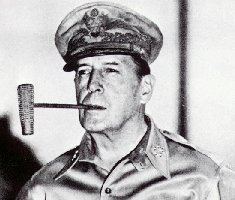 General Douglas MacArthur
General Douglas MacArthurTherefor, contrary to some reports of SCR serving in combat in the Pacific, this investigator has
determined, on flimsy evidence to be sure, that SCR wrote only about the reconstruction of Japan. However,
when General MacArthur got a read of his reporting, he ordered that it all be burned. The general refused to
explain why.
It is believed that SCR's grandson, Stuart Providence Ripley, has, amongst other things he is sitting on
like a paranoid mother hen on bogus eggs, a diary, which, MacArthur never knew about. In that, SCR allegedly
described, amongst other things, two days and nights he spent with Tokyo Rose. It is supposed to be a hot and
steamy recount of hot and steamy activity they both enjoyed. Perhaps someday we will know the details and
facts, though given a choice, this investigator prefers details over facts any day.
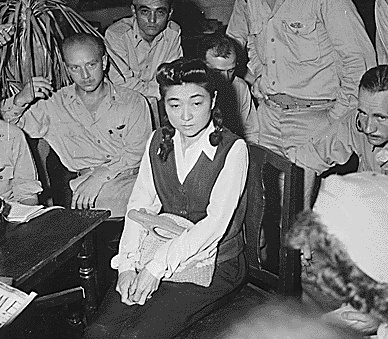 Tokyo Rose. Ripley, mustache, is on far right
Tokyo Rose. Ripley, mustache, is on far rightWhat about post-war SCR? He went back to writing with a vengeance. Except, he had forgotten how to
write, if he ever knew. Or, as some would say, in particular, the survivors of that flight with him and Ed-M.,
"SCR could write about as well as he could sing." Now, hold-on a second: Inability to write should certainly not
be viewed as an impediment to writing as many people who can't write worth a diddle still waste vast resources
on the effort, so, we can't fault the man for trying, can we? Of course not. SCR, around October of 1947,
polished off a whole bottle of Scotch and realized he was a dismal disgrace to another still-born Great American
One. Thus...
He turned his beleaguered talent to poetry which was brilliant, compared to his writing, as it was on a
level commensurate with: "There once was a farmer named Fritz."
One passing note: In the "Selected Bibliography, Stewart Cummings Ripley," we find listings for, Angel
in the Clouds as 1938 and, In Time of War as 1946. Those dates probably should be reversed as a
confidential memo from the last living member of that B-25 crew inform us that "Angel" is the story of SCR's
stowaway on the flight with Ed M. Obviously, that could not have been written in 1938.
_____________________________

